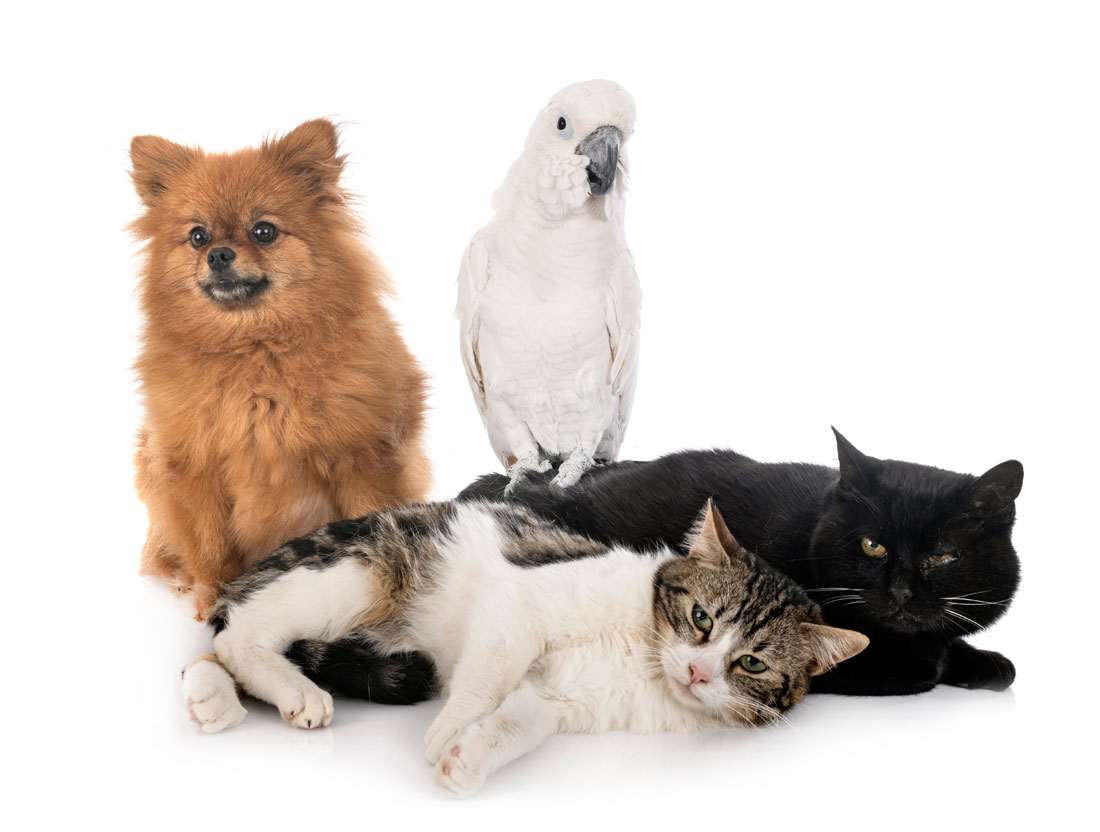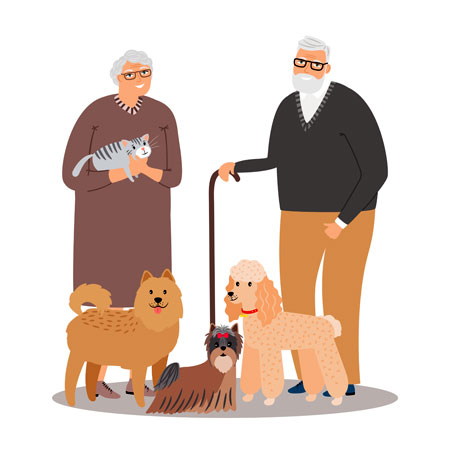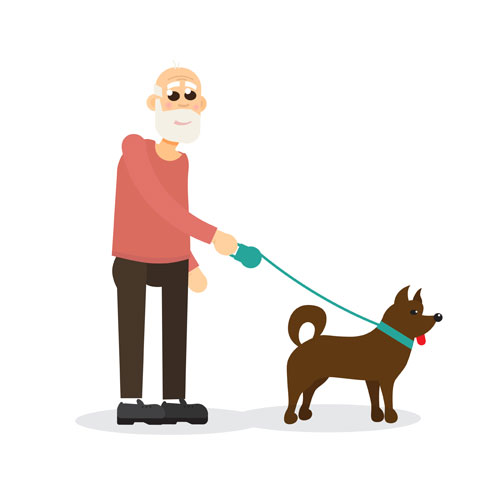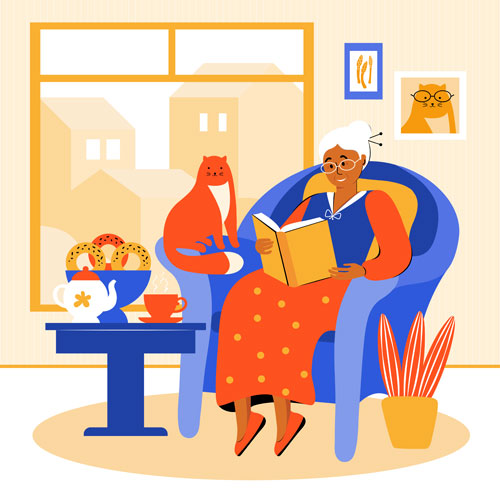The best pet for an elderly person is one that meets his or her needs.
There are many things for an older adult to consider when getting a pet, including their ability to care for a pet, lifestyle, and pet needs. If they want a pet for companionship, a small house kept animal may be best, but if they’re going to exercise more, get out of the house, and interact with others, a more active or larger pet might be more appropriate.
Birds, cats, dogs, and fish often rank highest among recommended pets for elderly people, but more than the owner’s age or type of animal must be considered when choosing a companion.
Table of Contents
What do I need to consider when getting a pet?
Your abilities
Many times, when people think of the elderly, they think of some feeble, fragile grandmother who can barely move or a grandfather with no teeth who cannot see well. For millions of older people, nothing could be farther from the truth.
Many people are active, healthy, and alert. Your physical health and abilities should be one of the first considerations when choosing pet ownership. For example, if you are in ill health or have mobility issues, a large breed dog or animal that needs constant care and physical activity will not be the best choice. Still, for people in these positions, pet ownership is not impossible. You simply must choose a pet with fewer needs. Fish, birds, small breed dogs, and cats can all be good choices. However, there are limitations with each of these as well, and each should be considered carefully.
On the other hand, people in top shape may find that large breed dogs and pets that require physical action and attention are perfect for them. They help them to stay active by going on walks or runs, and using the brain keeps it active. Having a schedule or regimen means that the pet owner must keep up with things and exercise their memory as well as their bodies. Physical and mental abilities must be considered.
For some people, pet ownership will not be advised. Senile seniors and those with severe physical or mental limitations should not be living alone in most cases, and they should not be left to care for a pet.
Size
Pets are one time that size matters. When considering what size pet that you need, think about why you want the pet. A bird will not offer the same security as a dog. In addition to the function, you need to refer to the first point and consider what you are capable of handling. If you have difficulty with movement, controlling a large animal while walking or going to vet appointments may not be the best for you.
In addition to your abilities to handle the animal’s size, you should also consider the amount of space you have. While you may love large animals, you cannot keep a horse in an apartment. Having pets means that they need the proper space to grow and develop, just as people do. Small animals such as fish, reptiles, amphibians, hamsters, gerbils, and arachnids may be better suited to smaller environments. Likewise, small pets may be overlooked in large spaces. Your pets and spaces need to have balance.

Needs
When considering a pet, you must consider what your needs are. If you are searching for a companion, a pet may be a great idea. You need to consider why you want a pet. If the pet is for companionship, a fish might be okay, but it is less likely to satisfy your needs. On the other hand, if you are just looking for something to pass the time and calm you, a fish tank is a fantastic idea. VIP Private Care recommends fish for anyone seeking a pet to help them relax.1 They are low maintenance and watching the water, fish, and sway of the plants can be calming.
If you need a pet for assistance, certain breeds of dogs are approved to be service animals and trainers to help them learn to provide people with the help that they need.
Companionship
Pets can be many things to many people. The most common reason people get pets is for companionship. Many older people are lonely, especially if their spouse has passed away. Pet companionship can alleviate this loneliness. Choosing a pet for companionship can also provide elderly owners with physical and mental benefits.
Some pets do not make the best companions. For example, a tarantula may be fun and exciting, and as an owner, you may learn a lot about arachnid activities, but it is not likely to be a pet for company.
Cost
Pets are not free. They can cost hundreds of dollars a year for supplies and veterinary bills. Aging in Place estimates that pets can cost up to $800 in the first year.2
These costs can be prohibitive for some seniors who want to own pets. Seniors can choose less expensive pets such as older dogs and cats, fish, gerbils, or hamsters. Older dogs and cats will still cost more than other animals, but the initial cost of vaccinations, well-animal visits, and specialty care are eliminated.
Elderly pet owners should also consider what they will do when there comes a time that they can no longer take care of their pets.
Travel
Many animals are magnificent for seniors traveling around the country. However, if you are traveling more than you are home, some pets are less advantageous. For instance, pets in tanks and cages will require that you have someone come to check on them often, except for fish. You can leave a weekend feeder and just ask someone to change it every few days and keep an eye on them.
However, a lizard, snake, or turtle will require someone to check on their food and water supplies regularly. Heat lamps are often used as well, and if the power goes out or a bulb burns out, this can be fatal for these animals.
Dogs and cats will probably need to travel with you, so how and where you are traveling will also be an issue. Some hotels and motels will not allow travelers to bring pets while others simply charge an additional fee. Airlines will also have restrictions, so if you are primarily flying, this will be an added concern.
Birds, rodents, and reptiles, on the other hand, are not likely great travel companions. If you will be leaving your pet behind, will you have to pay to board the pet or have a pet sitter? Your travel habits will play an integral role in what type of pet is best for you.
Maintenance
Grooming and bathing can become cumbersome for some individuals. Many dog groomers are available as well, but this means an extra trip or inviting someone else into your home. Dogs and cats need the most maintenance as fish, birds, and other pets do not often need grooming. Fish do not even need vet visits.
If you cannot comfortably handle the maintenance of an animal, it may not be the right choice.
Some animals, such as lizards and snakes, take care of their grooming by shedding their skin. Shedding can be fascinating as well as a low maintenance grooming activity.
Assistance
The last area you may want to consider is whether the pet will require assistance or help to care for it. If you will require assistance to take care of an animal, you will also need to consider what you will need and who will provide that aid. If you have assistance caring for yourself or you live in a senior community, there may be restrictions on what kinds of pets you may have.
Restrictions may include anyone who has allergies or may have phobias. Dogs and cats are unbelievable pets, but any pet with fur may have dander that can irritate allergies.
Assistants and caregivers should be considered or warned if you own or want to own a pet. While you are free to do what you want, considering others’ needs will prevent challenges later. Considering what type of assistance you have available or will need, is a critical step in pet ownership.
Age
Puppies and kittens are beautiful and sweet, but they are not the easiest to tend. My Animals explains, “Whether it’s a cat or a dog, it should be more than two years old. That way, it has already passed the age when it is most energetic and playful.”3 While you may want a young pet, an incredibly active pet may be too much for some people. Think about choosing an older pet rather than a young one.
What kinds of pets are suitable for me?
Dogs

Dogs can be fantastic pets for seniors. For active seniors, large dogs may be preferable. They help seniors remain active by requiring walks and playtime outside at precise schedules. Small dogs can help seniors increase their activity as well, but they do not require as much care.
Dogs can be more of a concern for some people than other animals. We often hear of dogs biting and becoming aggressive. They often need training or obedience classes before being suited for some households. Taking on this extra responsibility can be a challenge for some elderly pet owners, but they often find great rewards as well.
The following are a few breeds that you may choose whether you like small or large dogs. However, Aging Care notes that the breed is less important than individual personality.4 Always visit your intended pet before adopting it.
Large
- Labrador – These dogs are gentle and easy to train.
- Greyhound – This large dog is also very gentle. Greyhounds are much calmer than Labradors if you are worried about the activity level.

Medium
- Poodles – These dogs are very active and friendly. If you want to increase your exercise but do not want to struggle with a big dog, they may be perfect for you.
- Beagles – These are some of the sweetest dogs, but they are not always the most obedient. They often need a little extra love to be trained. If you do not mind the effort, in the beginning, Beagles can be fantastic companions.
Small
- French Bulldog – While very strong, these dogs are not overactive and enjoy time relaxing with their owners.
- Bichon Frise – These dogs are adorable. They do not shed much and can be trained very quickly.
Cats

Cats require less activity than dogs. They do not need to be walked and do not generally go outside to exercise and play. Cats also use litter boxes instead of going outside or using potty pads as dogs often do. Cats are great companions for people who need more of a relaxing pet but would like a pet they can include in their daily activities. Cats generally stay by themselves and may enjoy relaxing with their owners. Because of their general temperament, they are usually more suited to calmer environments.
Seniors with large families with small children may find that their cat hides when the children are around. The owner’s family may be a consideration if they are in the house frequently. However, seniors who are generally alone will often find that they feel the most comfortable with cats. They are reasonably low maintenance animals.
Birds
For some seniors, birds are the perfect companion. They are less work than dogs, but they are not without their responsibilities. Birds have different considerations than dogs and cats since they have different medical needs, upkeep, and food requirements. Birds can be great companions, however. If you want a pet but are not keen on the idea of cats and dogs, birds can be a great alternative. Cockatoos and typically small birds like Quaker Parrots are preferred, but African Greys and other birds may also be great companions.
Fish
Fishes are not companion pets as much as they are great for relaxation and routines. Feeding fish, cleaning tanks, and maintenance all require routines and help keep the mind sharp. Studies have shown that fish tanks can help lower blood pressure and relax seniors who feel stressed.
Fish ownership can be as simple as a single goldfish or a tank of exotic saltwater creatures. Your choices should make you happy, but it is essential to remember that with increased fish and tank size comes increased responsibility. Caring for an oscar is more challenging than caring for a betta.
Other pets
There are other types of pets such as hamsters, gerbils, tarantulas, lizards, rabbits, snakes, and snails that people sometimes choose to have. These pets can also have benefits for the elderly, but they are less commonly owned. Seniors should retain their individuality, and pets can help them to do that.
Do not skip an animal because you think people will be afraid. If you like snakes, consider one. You may have to educate the people who enter your home, and you will need to take appropriate safety measures, but people with dogs and cats do as well.

What are the benefits of pet ownership for the elderly?
The health benefits of pet ownership have been scientifically documented many times. Five Star Senior Living listed these benefits as lower blood pressure and cholesterol, reduce stress and depression, and long-term heart attack survival. In addition to helping to reduce stress, pets promote physical activity, which helps with weight management as well.
Seniors who are not as active as they want to be may decide that a pet will benefit. Small or medium dogs can help achieve an additional level of exercise. For already active seniors, more active animals may help tremendously. Active breeds of dogs such as Poodles, Boston Terriers, or Labradors are fantastic for the elderly who want to remain in peak physical condition.
Elderly individuals can also improve their cognitive skills as well. Pets require concentration and planning, which can also improve memory, both in the long and short term.
Animals are often used for therapy, so even if you do not own a pet, you may also find programs that allow you to interact with them. Because of the therapeutic nature of pets, senior owners with Alzheimer’s often see delays in symptoms. Pet ownership can also help maintain the brain’s function and delay the signs of dementia in other adults.
Social activities may also increase with pet ownership. The simple act of shopping at a store or going to the vet may allow an older adult to get out of the house and interact more. Walking in the park or going to dog parks not only increases exercise, but it also increases social interaction. Exercise will lower cholesterol and stress levels as well so including a social component can be good emotionally, mentally, and physically.
What are the risks of pet ownership?
Pets come with costs and disadvantages, so you must consider these things when choosing if pet ownership is right for you. Pets are fantastic, but they have vet bills, food requirements, and other needs that increase the cost of owning a pet. While older pets can sometimes be less expensive than puppies and kittens, unexpected illnesses, euthanasia, and other bills may be costly.
Another thing to consider, as mentioned above, is allergies. While people are less likely to be allergic to reptiles, arachnids, and fish, there are physical concerns for all pets. Those with breathing issues may find that fish tanks increase the humidity in their home and make them sick. In those cases, birds or reptiles may be better. Lizards can be great companions. They live in terrariums, but they can be taken out and played with or held.
Living arrangements are also critical to consider. Some apartments and senior living communities have restrictions on the types of pets that people may own. Choosing a large dog when the community does not allow it can create more challenges than the owner expected. These restrictions can put your current living arrangements at risk.
In addition to these, the ability to take care of a pet may change as you age. Forgetting to take care of an animal can result in sick or injured animals. The lack of attention to animal needs can create a safety issue. Injured animals are often challenging to handle and may hurt an elderly person.
For those concerned about the risks of pet ownership, some studies indicate that pet ownership and interaction are vital to seniors looking to continue caring for someone. Senior Living offers several well-researched studies.5 In these studies, the benefits can often outweigh the risks, but they note that the risks must be considered before ownership.
Related questions
Are pets good for the elderly?
Pets are fantastic for the elderly. They can provide social, emotional, mental, and physical benefits. Pets can help the elderly to exercise more, socialize in their neighborhood, relax, and decrease stress levels. Pet therapy has become much more common. Pet therapy may include ownership or programs where animals are brought to facilities for visits.
What is the best breed of dog for an older couple?
Older couples should work together to decide what type of dog they would like best. If they want a dog for protection or safety, they still need to make sure that they can both handle the dog. If they want a dog merely for companionship, they also have to decide how active the dog should be. If they have ambulatory issues, they may want to consider a dog that does not require as many daily walks. If they live in a house, they may even be able to let the dog into the backyard for exercise rather than walking it down the street. The best breed of dog for an elderly couple will meet the couple’s needs without adding more responsibility than they can handle.
Is pet ownership good for older people living alone?
Because pets help people to feel less lonely, owning a pet while living alone can be extremely beneficial. Older people, especially those whose spouse has died, will often want to have someone else around to pass the time. Although pets do not talk back, they can be great listeners and make people feel that they are less alone. Loneliness is one of the chief complaints of elderly people living by themselves. For this reason, pet ownership can increase an older person’s life expectancy. Exercise and daily activity will increase as their loneliness decreases.
What is the best dog breed for seniors and retirees?
Seniors and retirees enjoy many dog breeds for different reasons. They may want to stay active and choose an active dog that they will take outside for frequent exercise. On the other hand, they may wish to a lapdog to sit with them while they watch television or read. The need for companionship can mean that a smaller dog is best. Seniors and retirees are no different from anyone else. They all need to choose the best dog breeds for their needs.
References
1 “5 Bet Companion Pets for Elderly Persons.” VIP Private Care. 10 August 2017. https://viprivatecare.com/top-5-best-companion-pets-elderly-persons/. Accessed July 3, 2020.
2 “Seniors and Pets.” Aging in Place. n.d. September 2020. https://www.aginginplace.org/seniors-and-pets/. Accessed September 24, 2020.
3 “The Best Pet for the Elderly.” My Animals. 20 April 2019. https://myanimals.com/latest-news/adoption/the-best-pet-for-the-elderly/. Accessed July 8, 2020.
4 Bursac, Carol B. “How to Pick a Pet for a Senior Citizen.” Aging Care. n.d. https://www.agingcare.com/articles/pick-a-pet-for-senior-172923.htm. Accessed July 7, 2020.
5 “Which are Better Pets for Seniors: Dogs or Cats?” Senior Living. n.d. https://www.seniorliving.com/article/which-are-better-pets-seniors-dogs-or-cats. Accessed July 7, 2020.
